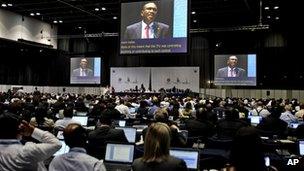UN net meeting 'hit by hackers' causing website disruption
- Published

A UN conference to discuss the future of internet governance has been disrupted by a suspected hacking attack.
The World Conference on International Telecommunications (Wcit) is debating changes to a wide-ranging communications treaty.
Delegates were unable to access material relating to the meeting after its website was forced offline.
Hacker groups had claimed responsibility, organisers said.
The UN's International Telecommunications Union (ITU) said delegates had been left "frustrated" by the disruption, which lasted for about two hours on Wednesday.
"However, a spirit of camaraderie prevailed," it said in a statement. "With those who had access to up-to-date online versions of the texts willingly sharing with other delegates in order to keep discussions moving forward."
Deep packet
ITU Secretary General Hamadoun Toure criticised those responsible for the downtime.
"It is ironic that the very people who claim to be fighting for a free internet are preventing those around the world trying to follow the event online from getting access," he said.
"Do they believe in one rule for them, and one for everyone else?"
The apparent hack attack follows the approval of a new standard for deep packet inspection by a meeting last month of the World Telecommunication Standardisation Assembly.
The technique is used by telecom operators to get an overview of the number of blocked or dropped calls, and other traffic issues. But it can also be used to spy on individual customers to see which sites they visit and how much data they use.
The Center for Democracy & Technology expressed concern at its approval.
"The telecommunications standards arm of the UN has quietly endorsed the standardisation of technologies that could give governments and companies the ability to sift through all of an internet user's traffic - including emails, banking transactions, and voice calls - without adequate privacy safeguards," the group said in a statement.
"The move suggests that some governments hope for a world where even encrypted communications may not be safe from prying eyes."
US concern
The US later noted that the standard's introduction had been a private sector initiative, adding the United States would oppose it being used to monitor individuals as that would be "an invasion of privacy".
The country's ambassador to Wcit added that he was "very concerned" by the apparent hack attack.
"There has been a big focus on transparency at this conference and the ITU has made all the main plenary discussions available via webcasting," said Terry Kramer.
"They've posted the proposals on their site. So taking that site down creates an impression that there isn't transparency."
- Published4 December 2012
- Published3 December 2012
- Published21 November 2012